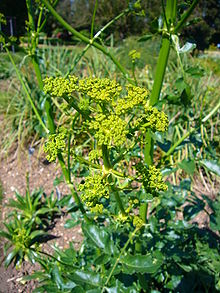- Opopanax
-
Opopanax chironium 
Scientific classification Kingdom: Plantae (unranked): Angiosperms (unranked): Eudicots (unranked): Asterids Order: Apiales Family: Apiaceae Genus: Opopanax Species - Opopanax chironium
- 2 other species
Opopanax chironium, also known as sweet myrrh or bisabol myrrh, is a herb that grows one to three feet high and produces a large, yellow inflorescence. The plant thrives in warm climates like Iran, Italy, Greece, Turkey and Somalia, but also grows in cooler climates. Some view opopanax grown in cooler climates as being of inferior quality.
A consumable resin can be extracted from opopanax by cutting the plant at the base of a stem and sun-drying the juice that flows out. Though people often find the taste acrid and bitter, the highly flammable resin can be burned as incense to produce a scent somewhat like balsam or lavender. The resin has been used in the treatment of spasms, and, before that, as an emmenagogue, in the treatment of asthma, chronic visceral infections, hysteria and hypochondria. Opopanax resin is most frequently sold in dried irregular pieces, though tear-shaped gems are not uncommon.
Opopanax is also used in the production of certain perfumes.
The spelling 'opoponax' is also widely used (eg in [1]). The OED gives 'opopanax' as the principal spelling, but lists 'opoponax' as a variant spelling recorded from the 19th century.[2]
Etymology
From Anglo-Norman opopanac, from Latin opopanax, from Hellenistic Greek ὀποπάναξ, from Ancient Greek ὀπός ‘vegetable juice’ + πάναξ ‘panacea’ (all healing).[2]
Cultural references to opopanax
- King Solomon allegedly regarded the opoponax as the noblest of incense gums.[citation needed]
- In the thirteenth chapter of James Joyce's Ulysses (Nausicaa), Leopold Bloom recognizes opopanax as an ingredient in the perfume of his wife, Molly.
- In The Grand Duke, by W. S. Gilbert, the mock-Grecian chorus that opens the second Act repeat the words "Opopanax eloia!" many times.
- In the novel Black House by Stephen King and Peter Straub, the word opopanax is used repeatedly and constantly in a nonsensical fashion, as both a verb and an adjective (e.g. "distant cry of the opopanax", the opopanax this, the opoponax that, etc.) eventually becoming a symbol for all the strange and incomprehensible events unfolding in the book.
- In another Stephen King novel, Wolves of the Calla (the fifth book in The Dark Tower series), a character holds an "opopanax feather", thus suggesting that it is the name of a bird. No other explanation is given in the story.
- In the novel Against the Day by Thomas Pynchon, the child mobster "Plug" Loafsley runs a club that smells strongly of opopanax, vervain, and bodily ejecta.
- Gives the title of John Brosnan's 1993 SF novel 'The Opopanax Invasion', where an alien DNA is contained in a resin said to be similar to the opopanax.
- In the novel 'The Lost Luggage Porter' by Andrew Martin, the hero's wife has sweet jars of Parma Violets and Opopanax.
- The title of the novel L’Opoponax, by French feminist writer and theorist Monique Wittig, which describes a rebellious young girl's experiences in a convent school.
References
- ^ "Opoponax". Botanical.com. http://botanical.com/botanical/mgmh/o/opopon10.html. Retrieved 2005-12-15.
- ^ a b "opopanax". Oxford English Dictionary. http://dictionary.oed.com/cgi/entry/00332792?single=1&query_type=word&queryword=opopanax. Retrieved 2009-12-27. (subscription required)
"Opoponax (sweet myrrh)". Scents of the Earth. http://www.scents-of-earth.com/opoponax.html. Retrieved 2005-12-15.
Wikimedia Foundation. 2010.
